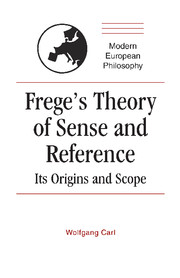Book contents
- Frontmatter
- Contents
- Preface
- Introduction
- 1 Frege's logic
- 2 The separation of the psychological from the logical
- 3 To break the power of words over the human mind
- 4 The thought
- 5 The reference of sentences
- 6 Judgement and knowledge
- 7 The reference and sense of names
- 8 Frege's contributions to epistemology
- Bibliography
- Index
2 - The separation of the psychological from the logical
Published online by Cambridge University Press: 05 June 2012
- Frontmatter
- Contents
- Preface
- Introduction
- 1 Frege's logic
- 2 The separation of the psychological from the logical
- 3 To break the power of words over the human mind
- 4 The thought
- 5 The reference of sentences
- 6 Judgement and knowledge
- 7 The reference and sense of names
- 8 Frege's contributions to epistemology
- Bibliography
- Index
Summary
In the preface to The Foundations of Arithmetic, Frege states three principles that, though well known, are not properly understood, because they are considered in isolation. These principles constitute the very kernel of his philosophical views before his discovery of the distinction between sense and reference and are connected with each other. An account of their relationship will reveal how his criticism of psychologism is related to his concerns with the meaning of linguistic expressions and with the logical analysis of thoughts. In this way one will realise the distinctive philosophical nature of the various achievements brought about by Frege before 1890.
The first principle laid down by Frege in The Foundations states that “one has to separate sharply the psychological from the logical, the subjective from the objective”. What does he mean by this? Is it an invitation to draw one distinction or is he concerned with two distinctions? And if with two, how are they connected? To answer these questions one has to consider why and how the distinction between the psychological and the logical is to be made. As we have seen, this distinction is supposed to be not between two different kinds of things but between two different ways of looking at one and the same thing. What particular properties one can isolate are determined by the complex character of our actual thinking, which as it “naturally develops” or “takes place”, has two different kinds of properties, called “logical” and “psychological”.
- Type
- Chapter
- Information
- Frege's Theory of Sense and ReferenceIts Origin and Scope, pp. 26 - 52Publisher: Cambridge University PressPrint publication year: 1994



